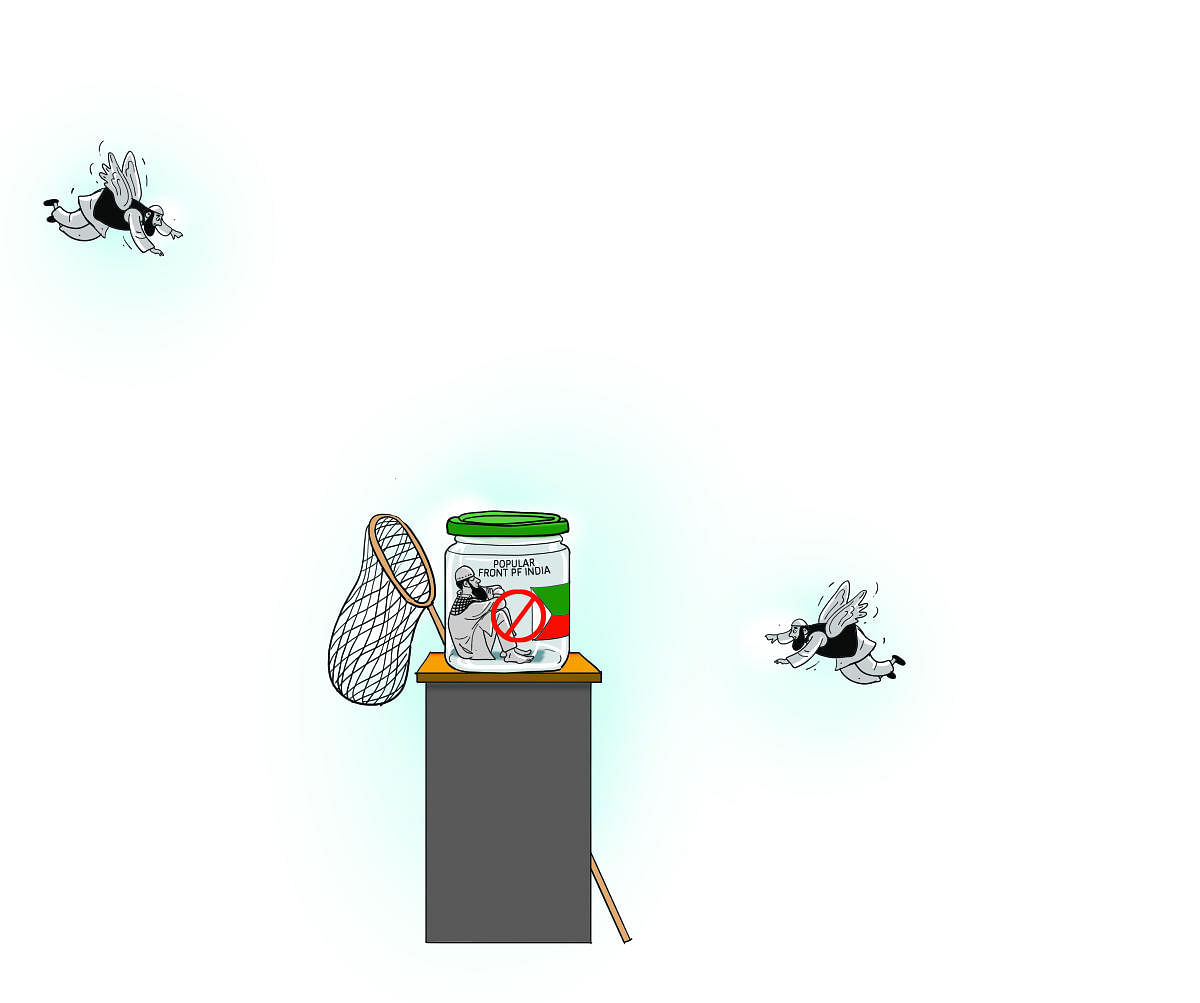
The ban on the Popular Front of India (PFI) could be counterproductive and make it conducive for minority communalism to grow among Muslims, fear community leaders and political observers. The intent of the ban has also been questioned since the Social Democratic Party of India (SDPI), considered as the political arm of the PFI, remains free to function. The PFI activists thus can continue to operate under the cover of the SDPI and eventually regroup as it earlier happened in the case of the Students’ Islamic Movement of India (SIMI) after it was banned.
Political outfits, such as the Indian Union Muslim League (IUML) and All India Majlis-E-Ittehadul Muslimeen (AIMIM), which are Muslim-led but reach out to all sections of society, have shared their concerns about the pitfalls of the ban on the PFI.
They say that they kept their distance from the PFI, given its radical ideological moorings, but now fear that as a result of the ban, the PFI-SDPI will gnaw at their support base. These parties, the Left, as has the Congress, question the rationale of banning it, while not acting against outfits like the RSS, which were accused of advocating majority communalism.
“The RSS and other Hindutva outfits openly issue threats to minorities,” says political commentator Hameed Chennamangaloor, questioning the partisan nature of the ban on the PFI, which would only increase the misgivings among the Muslim community about the BJP-run governments at the Centre and in several states.
Prime Minister Narendra Modi’s call to the party cadres to reach out to Pasmanda Muslims and the Rashtriya Swayamsevak Sangh chief Mohan Bhagwat’s visit to mosques are unlikely to allay the apprehensions in the Muslim community, as these are seen only as pre-election gimmicks of the ruling dispensation. The SDPI has a significant presence in as many as 10 states and, according to its leaders, representation in nearly 800 local body seats either directly or indirectly. It also enjoys a nexus with mainstream opposition parties in its strongholds, leading to mutual electoral gains. That the SDPI has not been banned has triggered speculation that its presence and fielding candidates in the upcoming assembly polls, particularly in Karnataka, could help split the minority votes that would otherwise go to the Congress.
The SDPI leaders say they are not anticipating any ban on it as the party is not not involved in any unlawful activities. But, according to the government sources, as the investigation by the National Investigation Agency (NIA) into the PFI would progress, a ban on the SDPI in due course could not be ruled out.
The SDPI is a registered political party with elected representatives in local bodies; banning it would not be easy, unless its links with banned outfits could be established.
Not all agree with such assessments though. T K Rajmohan, a retired Indian Police Service officer, said establishing the SDPI’s links with the PFI should not be arduous. The former NIA officer believes that the central agencies would be more vigilant in the states ruled by the non-BJP parties, where the SDPI might have connections with other mainstream political parties.
Rajmohan and Chennamangaloor say plugging the funding sources is the ideal course of action against extremist outfits, such as the PFI. They say that it is the lure of money that first draws the youths to such outfits, which subsequently radicalise them.
The Centre seems to be moving in the right direction as the Enforcement Directorate has also chipped in, says Rajmohan. The political leaders have flagged the likely impact on the community though.
The AIMIM leader Asaduddin Owaisi tweeted that every Muslim youth carrying a PFI pamphlet could now be arrested under the Unlawful Activities (Prevention) Act.
The IUML’s Kerala general secretary, P M A Salam, also raised concerns about the ban.
Popular Front Of India
1994: National Development Front (NDF) was established in Kerala
2001: Karnataka Forum for Dignity (KFD) was established in Karnataka
2006: NDF and KFD merged, Popular Front of India (PFI) was born, PFI called itself “A neo-social movement that strives for empowerment of marginalized sections of India. Many PFI leaders allegedly had links with the outlawed SIMI.”
2009: PFI held public meeting, marking conclusion of its national political conference, expanded to Andhra Pradesh, Goa, Rajasthan, West Bengal and Manipur after merger of social organisations, held freedom parade on Independence Day on August 15.
2010: People with alleged links to the PFI chopped off the hands of Prof T J Joseph as he allegedly set question that they perceived blasphemous.
2011: People allegedly linked to the KFD, which had merged with the PFI, was accused to have kidnapped and murdered two boys from Mysore.
2012: Kerala Govt told High Court that the PFI was a resurrection of the SIMI, inimical to the safety of the country, HC upholds Govt’s ban on PFI’s Freedom Parade
2013: Police raid at Narath in Kannur in Kerala led to arrest of 21 PFI activists and recovery of bombs, explosives, bomb-making manuals. NIA starts investigation.
2014: Kerala Govt. again submitted before the HC that the PFI activists were involved in 27 Murder cases, 86 Attempt to murder cases, 106 Other cases
2015: The PFI was accused to have played a role in communal clashes in Shivamogga in Karnataka.
2017: Kerala Police identified 6 people who were allegedly had links with the PFI and had joined the Islamic State in Syria
2019: 18 members with alleged links with the PFI were accused of murdering PMK member Ramalingam in Tamil Nadu.
2022 ‘OPERATION OCTOPUS’
Sept 22 NIA and other law-enforcing agencies arrest over 100 PFI leaders, activists during raids across the country.
Sept 27 The crackdown continues, nearly 250 more PFI leaders,activists arrested
Sept 28 The Centre bans PFI and its 8 associate organisations for 5 years under the Unlawful Activities (Prevention) Act.